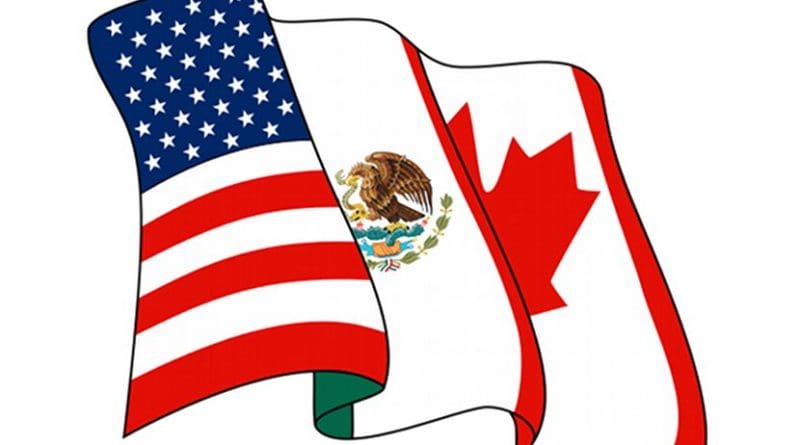North America Trade Treaty Is Welcome, But China Row Still Looms Large – OpEd
By Arab News
By Cornelia Meyer*
It went down to the wire, but a deal was reached between Canada and the US to salvage their accord with Mexico, saving the trilateral nature of North America’s trade relationship.
The new treaty, dubbed the US-Mexico-Canada Agreement (USMCA), is a reworking of the 1994 North American Free Trade Agreement (NAFTA). President Donald Trump has made good on his election promise to review global trade arrangements, NAFTA in particular. The three nations had negotiated for more than a year until they finally reached consensus. There is now a 60-day congressional review period before the US president can sign the USMCA.
In late August, Mexico agreed to a regime where 75 percent of car parts were produced in North America and 40 to 45 percent of parts had to be manufactured by workers earning an hourly wage of at least $16. The question then was what would happen with Canada. Both Trump and Canadian Prime Minister Justin Trudeau were equally petulant, insisting that the most important thing was that any deal was good for their respective countries. Trump even threatened to go it alone with Mexico. That was a brave statement. Canada is the second largest export market for the US after the EU, with $341 billion of American goods and services sold in Canada last year.
The result of the standoff was that Canada agreed to limit exports of vehicles to 2.6 million and give US farmers access to its dairy markets. The latter pretty much mirrors what Canada agreed with the EU in a deal approved by the EU Parliament in February 2017.
What Donald Trump risked during this exercise was alienating his two neighbors — especially Canada. He also put at risk the 6 million US jobs that are tied to NAFTA-related trade. NAFTA was in force for a quarter of a century and this created certain realities, particularly in the highly integrated supply chains of the automotive sector, where parts get shipped back and forth between borders.
Yet the USMCA deal was struck, and markets reacted positively, with the Mexican peso and Canadian dollar gaining in strength. Markets are happy to see trade deals being done, such as the one between the US and South Korea in September.
While this is all positive, the biggest trade war — between the US and China — shows no sign of abating. China even refuses to come to the negotiating table as long as the threat of a levy on an additional $200 billion worth of Chinese exports to the US is on the cards. Trump may have a point when he bemoans Chinese non-tariff barriers, attitudes toward foreign investment and the country’s disregard of intellectual property rules. However, when he focuses on bilateral trade of goods he misses the issue, and foregoes an opportunity to build a broad-based international coalition to achieve his goals.
The issue goes well beyond the US’ relationship with China. Trump is undermining the entire global trade architecture, of which the US has acted as the sponsor and guarantor since World War II. He abrogated the Trans-Pacific Partnership (TPP), which was an important treaty devised by the Obama administration and which would have limited Chinese influence in the Asia-Pacific. In other words, Trump was actually playing into the hands of China.
More importantly, Trump is turning trade into a zero-sum bilateral game. Trade, by its very nature, is multilateral and needs the World Trade Organization (WTO) to act as impartial arbiter and midwife to multilateral deals. In that context, it is not a harbinger of good news that the US administration blocked the reappointment of one of four remaining WTO appeals judges. In many ways this goes against US interests. The US has won many an arbitration case in the WTO, and may at some stage need an impartial body to adjudicate disputes, such as when one of its bilateral trade deals runs into trouble.
Why should seemingly unaffected regions such as the Arabian Gulf be concerned about trade disputes between distant countries? Gulf states are looking to boost manufacturing to create jobs for their young, and an open trading system will be required to sell these goods overseas. On top of that, a large share of global oil consumption goes on transporting goods by truck, plane and ship — and any localization of supply chains would result in shrinking demand for freight. The world at large has every interest in keeping the borders and shipping lanes open to ensure the economic wellbeing of billions.
* Cornelia Meyer is a business consultant, macro-economist and energy expert. Twitter: @MeyerResources

